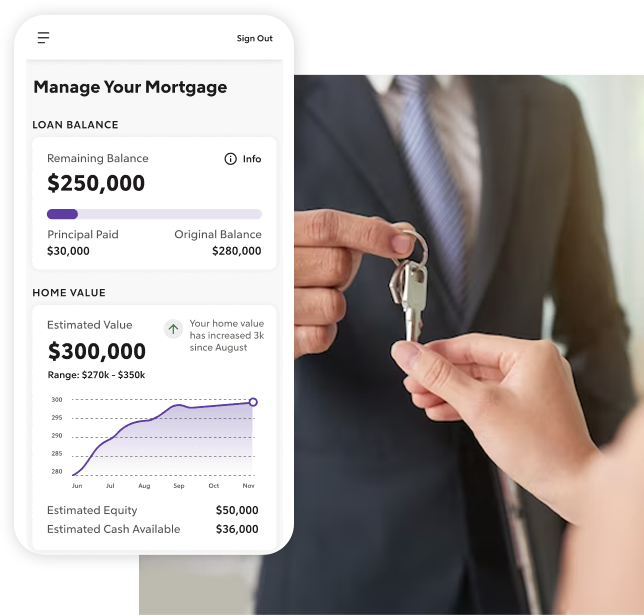FHA MORTGAGES FLORIDA
Your Florida FHA home mortgage is just a click away. Pre qualify without SSN.
Our Services

FHA Mortgage Loans Florida
Welcome to your premier resource for FHA Mortgages in Florida!
Struggling to find a way into the Florida housing market? FHA mortgages Florida provide a practical path to homeownership for Floridians faced with credit and down payment challenges. This guide will directly address how FHA loans facilitate buying a home in Florida, from meeting eligibility requirements to completing the application process, without overwhelming you with unnecessary details.
Key Takeways
-
FHA mortgages in Florida are designed to help those with lower credit scores or limited financial resources achieve homeownership, offering low down payments and flexibility in credit requirements.
-
Eligibility for FHA loans is determined by credit score, income, employment history, and property eligibility, requiring a minimum credit score of 580 for a 3.5% down payment or 500-579 with a 10% down payment.
-
FHA loans have set borrowing limits that vary by county, and buyers whose property costs exceed these limits must cover the difference with a larger down payment, ensuring loan amounts remain within manageable limits.
Understanding Florida FHA Mortgages
In the realm of home financing, FHA loans in Florida are distinct due to their particular characteristics and broad reach. Created by the Federal Housing Administration (FHA), these mortgages cater especially to individuals who might struggle with obtaining conventional loans because of less-than-perfect credit scores or challenging financial backgrounds. Within the competitive real estate market of Florida, FHA loans have become a pivotal resource for numerous residents looking to achieve homeownership.
Delving into what an FHA mortgage involves and how it influences homeownership within Florida will provide us with a deeper insight. We’ll explore these aspects thoroughly for greater clarity on how the federal housing administration (FHA) supports potential borrowers through such loan options specific to this region.
What is an FHA Mortgage?
The Federal Housing Administration provides a guarantee for FHA mortgages, which are home loans with a specific appeal to those who may not be eligible for traditional mortgage options. The underlying security of these mortgages comes from the mortgage insurance premium that the FHA requires—this acts as a safety net by ensuring that in cases where borrowers default on their loan, the FHA steps in to reimburse lenders’ losses. This mortgage insurance allows lenders to confidently issue loans to individuals whose credit histories or other factors might otherwise prevent them from securing conventional financing. Conversely, when it comes to down payments less than 20%, private mortgage insurance becomes necessary for those opting for conventional mortgages.
For prospective homeowners who find themselves grappling with lower-than-average credit scores, an FHA home loan could pave your path towards acquiring property. These particular loans boast competitive interest rates and have been crafted specifically to aid people—including novices buying their first homes—to navigate successfully into property ownership terrain.
The Role of FHA in Florida Homeownership
In Florida, the FHA is pivotal in advancing homeownership. Not only does it supply mortgage insurance, but it also establishes standards that promote equitable dealings and clarity throughout the home buying experience. Such regulations safeguard borrowers by thwarting unscrupulous lending methods and certifying that you, as a homebuyer, are protected from exploitation.
For those who are purchasing their first home or individuals aiming to refinance their current mortgage, the FHA guarantees that procedures are transparent, just, and within reach. Thanks to FHA loans, attaining homeownership in Florida has transformed from a mere aspiration into an attainable objective.
Eligibility Criteria for FHA Mortgages in Florida
Because FHA loans are designed with borrower-friendly characteristics, they may appear to be a straightforward ticket to owning a home. Yet, there is an array of specific qualifications applicants must satisfy. These include factors such as:
-
Credit score
-
Income levels
-
Employment history
-
Eligible property types
Understanding these prerequisites is crucial because it allows potential borrowers to evaluate whether they meet the necessary FHA loan requirements and recognize any aspects that might require enhancement for qualification purposes. Let’s take a closer look at these qualifying criteria.
Credit Score Requirements
The significance of your credit score cannot be overstated when it comes to qualifying for an FHA loan. To take advantage of the lowest 3.5% down payment option offered by the FHA, a minimum credit score of 580 is required. Yet those with credit scores ranging from 500 to 579 haven’t reached a dead end. They remain eligible for an FHA loan provided they make a larger down payment—at least 10%.
For individuals lacking conventional credit scores, there’s still hope with an FHA loan—you aren’t necessarily disqualified. The flexibility offered by the program allows potential borrowers to qualify using alternative indicators of fiscal responsibility like consistent rental and utility bill payments instead. This broader latitude in terms of acceptable proof makes fha loans particularly accessible and appealing across various borrower profiles.
Income and Employment History
FHA loans are not available for every property type, but they do cover a range of options including:
-
Detached homes designed for single families
-
Condominiums that have obtained approval
-
Townhouses
-
Homes manufactured from pre-designed parts
-
Properties featuring up to four separate living units
Whether you’re interested in acquiring a quaint townhome or owning a building with multiple apartments, the FHA provides support across various property types.
There’s an important stipulation. The financed property must be your primary dwelling place. In order to be eligible for the loan, you need to inhabit the residence most of the year. Although it’s not obligatory for all individuals sharing ownership (co-borrowers) to live on-site, at least one owner (borrower) needs to fulfill this occupancy criterion. Those seeking FHA loans for either investment purposes or as holiday retreats will have to consider different financing routes.

Property Types and Occupancy
FHA loans are not available for every property type, but they do cover a range of options including:
-
Detached homes designed for single families
-
Condominiums that have obtained approval
-
Townhouses
-
Homes manufactured from pre-designed parts
-
Properties featuring up to four separate living units
Whether you’re interested in acquiring a quaint townhome or owning a building with multiple apartments, the FHA provides support across various property types.
There’s an important stipulation. The financed property must be your primary dwelling place. In order to be eligible for the loan, you need to inhabit the residence most of the year. Although it’s not obligatory for all individuals sharing ownership (co-borrowers) to live on-site, at least one owner (borrower) needs to fulfill this occupancy criterion. Those seeking FHA loans for either investment purposes or as holiday retreats will have to consider different financing routes.
Benefits of FHA Mortgages for Florida Homebuyers
Having delved into the requirements for a Florida FHA loan, let’s shift our focus to the benefits these loans provide. FHA loans are particularly appealing to Florida homebuyers due to their minimal down payment demands, accommodating credit criteria, and the potential for sellers to contribute toward closing costs.
These loans are tailored with consideration for what borrowers need in order to broaden access to homeownership and enhance financial adaptability. We will explore these advantages further.
Lower Down Payments
FHA loans offer the notable benefit of a low minimum down payment, which is particularly accessible if you have a credit score of 580 or above. In such instances, the required down payment is only 3.5% of the loan amount. This substantially reduces the entry barrier to homeownership for individuals with lower credit scores when compared to conventional loans that typically necessitate a hefty 20% down payment.
Should your prospective home’s price exceed what’s allowable under FHA loan limits within your region, it might be necessary to increase your initial payment. Nevertheless, there are support programs available – like Florida’s Hometown Heroes Housing Program – that can work in tandem with an FHA loan and provide assistance towards meeting this higher down-payment obligation.
Flexible Credit Requirements
Individuals with less than stellar credit scores might find it challenging to secure a conventional mortgage. Yet, FHA loans offer a more accessible path. It has been noted before that even those with credit scores as low as 580 may qualify for an FHA loan if they can make a down payment of just 3.5%.
Should your credit score fall below the 580 mark, you’re not automatically disqualified from securing an FHA loan. You simply need to increase your down payment to 10%. This leniency is also extended to people who have experienced foreclosure or bankruptcy and would otherwise be shut out from obtaining a mortgage. In essence, FHA loans facilitate home buying for individuals spanning a broad range of credit histories and financial backgrounds.
Seller Assistance with Closing Costs
The requirement for upfront cash when purchasing a home is notably increased due to closing costs. Fortunately, FHA loans provide an option to alleviate this issue. Sellers have the ability to contribute as much as 6% of the sale price toward the buyer’s closing expenses. This assistance can significantly relieve buyers’ financial strain.
Contributions from sellers can be applied to various fees involved in closing, including those related to title services, appraisals, and insurance. Such contributions are not only advantageous for facilitating transactions, but also lessen the economic load on purchasers, thereby streamlining and economizing the process of acquiring a home.
Florida FHA Loan Limits and How They Affect Borrowers
FHA loans offer a range of advantages, but it’s important for prospective borrowers to understand that there are maximum borrowing amounts set by the FHA. These loan limits differ from one county to another within Florida.
Understanding these FHA loan limits is essential because they affect how much you can borrow, potentially impacting your purchasing capacity in the local housing market. We will explore how these loan limits are established and what it means if you need a loan amount that exceeds them.
Determining FHA Loan Limits
The annual adjustment of FHA loan limits takes into account the fluctuation in average home prices across different counties in Florida. In 2023, a single-family residence typically has an FHA loan limit of $472,030 throughout most counties in Florida. This cap escalates to as much as $874,000 for Monroe County and can even reach a peak of $1,089,300 in areas considered to be high-cost.
These modifications are made by HUD — the U.S. Department of Housing and Urban Development. They follow guidelines based on conforming loan limits that are established by the Federal Housing Finance Agency (FHFA). The minimum threshold or ‘floor’ for these loans is set at 65% of the national conforming loan limit while the ‘floor’, which represents their maximum allowable amount for FHA loans, is pegged at 150% of that same benchmark figure from FHFA.
Consequences of Exceeding Loan Limits
Should the price of your desired property exceed the maximum allowable amount for an FHA loan in your county, you won’t be able to secure an FHA loan exceeding that limit. But this doesn’t necessarily put your dream home beyond possibility.
To bridge the gap between the property’s cost and the cap on the FHA loan, a bigger down payment will be necessary. Although this may mean more money is needed upfront, it serves to keep your total borrowing within permissible limits of FHA lending guidelines, which helps maintain affordable monthly debt payments, inclusive of those for your FHA-backed financing arrangement.
Applying for an FHA Mortgage in Florida
Having delved deeply into the specifics of FHA mortgages in Florida, we must now turn our focus to how one goes about applying for an FHA loan. This process encompasses various stages such as getting all your paperwork ready, choosing a lender sanctioned by the FHA and going through each part of the application procedure.
For those who are venturing into home ownership for the first time or seeking to refinance their current mortgage, grasping these procedures is vital for a more seamless experience with your Florida FHA loan application. We will examine each step individually.
Preparing Necessary Documents
As you prepare to apply for an FHA loan, it’s important to gather key documentation such as:
-
Evidence of your income
-
Copies of credit reports
-
A government issued identification
-
Your Social Security number
-
Verification of employment status
-
Recent tax returns
-
Records showing previous rent or mortgage payment history
To expedite the application process for your FHA loan, having this paperwork prepared beforehand is beneficial. For any uncertainties regarding these documents, comprehensive instructions are available on HUD’s official website.
Navigating the FHA Loan Application Process
When you’re ready with your documents and have selected a mortgage lender, the journey of applying for an FHA loan begins. This step is more complex than just completing an application form. It requires disclosing extensive details regarding your finances, and could include getting a home appraisal.
For a streamlined process in obtaining an FHA loan, it’s advisable to get support from either a mortgage lender or consult with someone like a Mortgage Coach professional. Such experts can navigate you through each stage of the application, providing answers to inquiries you may encounter and steering clear of typical obstacles that might arise.
Our Latest Work

Our Expert Advisor

See what my clients
say about me

Best home buying
experience I have ever had!
Lorem ipsum dolor sit amet consectetur adipiscing elit quisque integer, pharetra tortor nisi scelerisque aliquam et euismod praesent, ultricies mattis dui.

John Mina
Consultant
Best home buying
experience I have ever had!
Lorem ipsum dolor sit amet consectetur adipiscing elit quisque integer, pharetra tortor nisi scelerisque aliquam et euismod praesent, ultricies mattis dui.

John Mina
Consultant
Blogs
How to Slash Your FHA Mortgage Rates in Florida Today
Exclusive FHA Loan Opportunities for Florida Veterans
How to Leverage FHA Loans in Florida for Maximum Benefit
Unlock Huge Savings on Your Dream Home with FHA Loans in Florida!
The Secret to Fast FHA Loan Approval in Florida Revealed
5 Insider Tips to Get Approved for FHA Loans in Florida Fast
FHA Mortgage FAQs
What is the downside to a FHA loan?
A notable disadvantage of securing an FHA loan is the obligation to pay a mortgage insurance premium upfront, amounting to 2.25% of the value of the loan, thereby raising the total expense associated with obtaining this type of mortgage.
What are the FHA loan limits in Florida?
In July 2021, we changed our official company name from Quicken Loans to FHA Mortgage. We did this because FHA Mortgage. defines what we do best – take a complicated process and make it simpler using technology.
What will disqualify you from an FHA loan?
Possessing an elevated debt-to-income ratio, inadequate credit, or a lack of adequate funds for a down payment, mortgage payments, or closing costs may render you ineligible to secure an FHA loan.
Ensuring that your credit score is robust and handling your financial matters prudently is essential.
Is it hard to get a FHA loan?
Qualifying for an FHA loan tends to be less stringent than for a conventional loan, given that FHA loans are accessible with lower credit scores and require smaller down payments.
As such, many prospective homeowners find that FHA loans provide a feasible route to purchasing a home.
What is the minimum credit score for an FHA loan in Florida?
The minimum credit score for an FHA loan in Florida is 580 for maximum financing with a 3.5% down payment. This is the threshold you’ll need to meet for eligibility.


